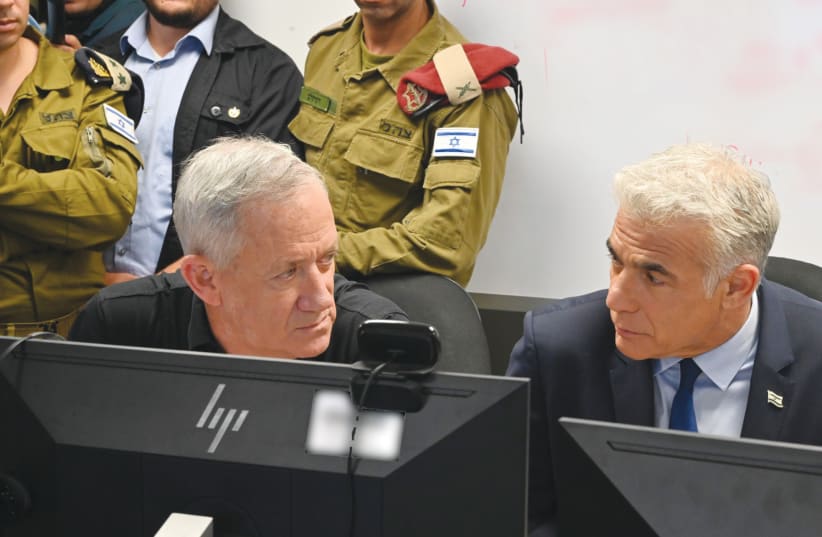The red phone on the prime minister’s desk is a potent symbol of responsibility and authority in Israeli politics, often used as a prop or slogan in election campaigns.
In a country confronted by constant security threats, a country where every other household has a son or nephew in the army, the answer to the question “Who is answering the hotline?” – meaning, who is the one making the top strategic decisions on matters of life and death? – is key in galvanizing voters.
From 2009 to 2021, former prime minister Benjamin Netanyahu claimed sole ownership of the red phone image in Israeli minds. Throughout this time, he was the only one sitting in the Prime Minister’s Office and answering that phone. This made it much easier for Netanyahu to ridicule any inexperienced wannabe who attempted to challenge him.
Operation Breaking Dawn, the first large-scale military clash since Netanyahu left office last year, broke his monopoly. It was one of the shortest and most successful campaigns the IDF has conducted against terrorist organizations in the Gaza Strip since the Disengagement (2005), eliminating the top command of Islamic Jihad in only three days.
And for the first time since 2009, it wasn’t Netanyahu issuing the orders, calling up world leaders, or making soothing patriotic speeches to an anxious nation on prime-time TV.
For Prime Minister Yair Lapid, after only one month in office, Breaking Dawn was his trial by fire. And he passed it with flying colors.
Lapid handled his first major security crisis with authority and composure, orchestrating the complex military, diplomatic and civilian fronts without missteps or miscalculations. He dedicated more than due attention to messaging and communication, otherwise known as hasbara, for both internal and international audiences, and was also the beneficiary of international support from the White House and European capitals.
If Netanyahu’s campaign managers had been planning on deploying the red phone once again to deride his main opponent as incapable and inexperienced, they might need to rethink their strategy.
On the third day of fighting, Lapid even briefed Netanyahu in his Tel Aviv bureau on the Gaza situation, marking a first since the latter left office. Over the past year, the former prime minister, now leader of the opposition, has boycotted the monthly security briefings with his predecessors Naftali Bennett and Lapid as mandated by law, supposedly to avoid granting them any kind of public recognition and legitimacy. But when the guns roar, political muses are silenced by a surge of patriotism and calls for national unity, and Netanyahu quickly adapted to evolving reality. He instructed all Likud members to cautiously back and support the government in talking points, and agreed to meet with Lapid and even have their joint photographs distributed to the press.
Lapid’s office chose to send out a serious image of the two; Netanyahu’s aides picked one in which both were smiling. Body language nuances aside, the photos were perceived as Lapid’s image of victory.
Gantz helps Lapid in steering the wheel
THE PRIME minister wasn’t the only one steering the wheel. As in any security flare-up, the prime minister’s copilot was the defense minister, Benny Gantz, who plays a crucial role in eroding Netanyahu’s monopoly on the coveted title of “Mr. Security.”
Lapid and Gantz have a complicated relationship, but throughout the Gaza operation they presented the image of close cooperation and partnership, appearing side by side in major public pronouncements.
In stark contrast to what is often depicted as Lapid’s shallowness or inexperience, Gantz’s military credentials are unquestionable, and this was the second successful Gaza operation he led as defense minister, following Operation Guardian of the Walls with Netanyahu last year. Gantz’s presence near the rookie Lapid highlighted his own security background and bolstered his image as the responsible adult defending Israel in the interim between one prime minister and the next.
Despite previous and existing tensions, Lapid and Gantz complemented each other and acted like a team once again. A so-called spontaneous photograph leaked from behind the scenes even showed them in a friendly and intimate embrace during side consultations. It immediately went viral, bringing up memories of their past Bromance and their effective political collaboration over three election campaigns. Back in 2019, when they first formed an alliance and established the original Blue and White list, Gantz and Lapid built a large party and created the strongest center challenge to the Likud in ages.
Lapid and Gantz: Rivals in Israeli elections
Three years and a lot of bad blood later, Lapid and Gantz are now political rivals: Gantz’s goal in the upcoming election is, simply put, to usurp Lapid. But the security deterioration left the two no choice but to join forces and create a cartel that undermines Netanyahu’s monopoly on security affairs.
ON MONDAY evening, however, less than 24 hours after the ceasefire took hold, all three big TV channels published initial opinion polls that showed Operation Breaking Dawn had almost no impact on the electoral map. The prime minister and defense minister received high approval ratings for steering the wheel, but the number of seats they got hardly changed. And despite breaking Netanyahu’s red phone monopoly, the Likud hadn’t lost support, with the right-wing bloc polling at 59 mandates, very close to the 61-seat majority needed to ensure a Netanyahu comeback.
Both Lapid and Gantz narrowed the gap on the question of who is most fit to serve as prime minister, but Netanyahu still led by a wide margin, with 42-43% support, compared to 31% for Lapid and 23% for Gantz.
It might be a matter of time. It’s possible that in a few weeks the effects of the successful operation will sink in and be reflected in the polls. But it can also signal that perhaps the red phone isn’t as important as we tend to think, or has been reduced, along with many other issues and matters, into the binary question of yes or no Bibi. After almost three years with five election campaigns, support or opposition to Netanyahu has become a question of identity, not positions, and is overriding ancient ideologies and dispositions, even about the mythological red phone.
The apparent and evident Lapid-Gantz teamwork throughout the Gaza operation generated a wave of naive hope among their supporters that they might be able to collaborate again on the political battlefield, as well.
Former IDF chief of staff Gadi Eisenkot, who is contemplating his own political career, even suggested such a plan to the two leaders, who are both trying to draft him to their respective parties.
So far, Lapid and Gantz have politely brushed him off. Their bitter personal history is still stronger than any political logic, and Netanyahu is counting on it for the day after the election. If he fails to reach the 61 majority, his main goal will be to divide and conquer them, once again.

